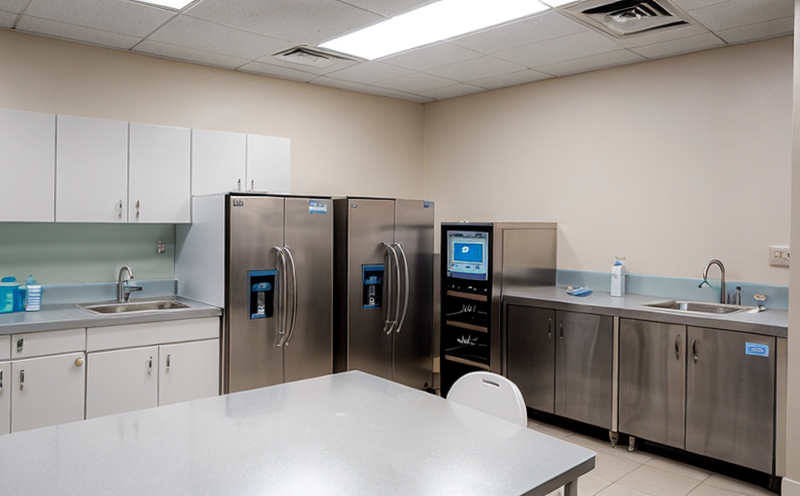ISO 11737-2 Sterility Test (Membrane Filtration)
The ISO 11737-2 test is a critical method used to validate the sterility of medical devices. This rigorous procedure ensures that all potentially pathogenic microorganisms have been removed or eliminated through sterilization processes. Compliance with this standard is essential for manufacturers, regulatory authorities, and end-users alike.
During membrane filtration testing, an aqueous extract from a medical device sample passes through a membrane filter of specified pore size. The filter retains any viable bacteria that may be present in the extract. This extracted material is then incubated under conditions suitable for bacterial growth. If no colonies are observed after the prescribed incubation period, the test results confirm the sterility of the device.
This testing method is particularly important because it addresses some of the limitations of traditional media-based tests such as the pour plate and spread plate methods. The membrane filtration technique offers faster results due to its ability to concentrate bacteria more efficiently on the filter surface compared to dilution techniques used in other sterility tests.
The process begins with careful selection of appropriate test solutions, which can vary based on the material composition of the device being tested. It is crucial that the extraction solution does not interfere with the subsequent microbiological analysis. After thorough preparation and pre-treatment steps, the sample undergoes filtration using a membrane filter of 0.45 μm pore size.
The collected extract is then transferred to an appropriate container for incubation at temperatures ranging between 35°C and 37°C depending on the expected microorganisms. Incubation periods typically range from 14 days up to 28 days, although shorter times may suffice if initial results indicate sterility.
Following incubation, any visible colonies are counted and their characteristics noted. Negative results (no growth) confirm that the device is sterile; positive results require further investigation into potential contamination sources or reprocessing issues.
The ISO 11737-2 standard also emphasizes the importance of proper documentation throughout all stages of testing. This includes detailed records of sampling procedures, media types used, environmental controls during incubation periods, and final interpretations of test outcomes. Proper documentation ensures traceability and compliance with regulatory requirements.
Membrane filtration tests are widely recognized for their accuracy in detecting even low levels of contamination. They provide reliable evidence supporting the efficacy of sterilization processes employed by manufacturers. By adhering to this standard, companies can ensure that their products meet stringent quality standards before reaching marketplaces worldwide.
| Use Case | Description |
|---|---|
| Medical Device Validation | Testing sterilization efficacy of medical devices. |
| Regulatory Compliance | Meeting ISO standards for sterility testing. |
| R&D & Development | Evaluating new sterilization methods or processes. |
The robust nature of the ISO 11737-2 membrane filtration test makes it indispensable for ensuring product safety and reliability in healthcare settings. It plays a vital role in safeguarding patients from infections caused by non-sterile devices, thereby enhancing overall patient care.
- Ensures compliance with international standards
- Guarantees accurate detection of contamination
- Promotes consistent quality across manufacturing processes
Environmental and Sustainability Contributions
The ISO 11737-2 Sterility Test (Membrane Filtration) contributes positively to environmental sustainability by promoting efficient use of resources. By ensuring that medical devices are properly sterilized, this test minimizes waste generated from non-functional or contaminated products reaching consumers.
- Reduces the need for reprocessing and disposal of improperly sterilized devices
- Supports circular economy principles through optimized product lifecycle management
- Promotes responsible resource utilization in healthcare settings
The test's emphasis on accurate detection ensures that only truly sterile products enter clinical use, thereby reducing the risk of infections and other adverse events associated with contaminated devices. This contributes to better patient outcomes while simultaneously supporting sustainable practices within the healthcare industry.
Competitive Advantage and Market Impact
Adopting ISO 11737-2 Sterility Test (Membrane Filtration) can give companies a significant competitive edge in several ways:
- Enhanced reputation as a leader in quality and safety
- Increased market share due to higher customer trust in product reliability
- Facilitates easier compliance with international regulations, broadening potential markets
Beyond these immediate benefits, consistent application of this standard can lead to long-term advantages such as reduced liability risks and improved operational efficiency. Companies that prioritize sterility testing not only meet current regulatory demands but also position themselves ahead of future standards and expectations.
In today's globalized market, where healthcare products face increasing scrutiny from both consumers and regulators alike, adherence to international standards like ISO 11737-2 is increasingly becoming a non-negotiable requirement. By incorporating this testing into their quality assurance protocols, manufacturers can stay ahead of the curve and maintain a strong foothold in competitive landscapes.
Use Cases and Application Examples
The ISO 11737-2 Sterility Test (Membrane Filtration) finds extensive application across various sectors within medical device manufacturing. Here are some key examples:
| Sector | Use Case |
|---|---|
| Orthopedic Implants | Validation of sterilization processes before device release. |
| Bio-medical Instruments | Evaluation of new sterilization methods for emerging technologies. |
| Hospitals & Clinics | Internal quality control checks on incoming products. |
In each case, the rigorous nature of the ISO 11737-2 test ensures that only sterilized devices meet stringent regulatory requirements and provide safe patient care. This reliability is crucial for maintaining trust between manufacturers and healthcare providers.





